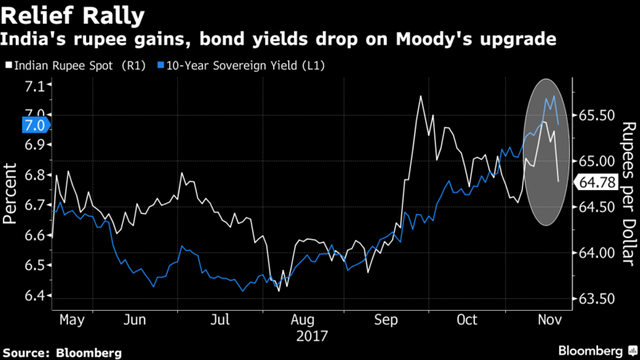Rupee and government bonds rally, stock markets surge
Moody’s says reforms reduced risk of sharp increase in debt
Indian Prime Minister Narendra Modi. Photographer: Dhiraj Singh/Bloomberg
Moody’s Investors Service raised India’s sovereign rating for the first time since 2004, overlooking a haze of short-term economic uncertainties to bet on the nation’s prospects from a raft of policy changes by Prime Minister Narendra Modi.
The rupee, bonds and stocks rallied after the ratings firm upgraded India to Baa2 from Baa3 and said reforms being pushed through by Modi’s government will help stabilize rising levels of debt. That’s a one-level shift from the lowest investment-grade ranking and puts India in line with the Philippines and Italy.
While government officials hailed the move as long overdue, some investors termed it a surprise given that India recently surrendered its status as the world’s fastest-growing major economy amid sweeping policy change. The upgrade could prove to be a big win for the ruling party, which is facing increasing attacks about the economic slowdown before key elections in Modi’s home state next month.
"This is a positive surprise to the markets, especially in terms of timing," said Vivek Rajpal, a rates strategist at Nomura Holdings Inc. in Singapore. “One fear that was developing in the market was debt-flow positioning.”
The rupee surged as much as 1 percent to 64.67 per dollar in Mumbai while the yield on the 10-year sovereign bond tumbled 11 basis points to 6.96 percent and the benchmark equity index rose 1.25 percent.
Ease of Business
Modi has pushed through sweeping reforms, with mixed results. Last year’s removal from circulation of almost 90 percent of the nation’s currency weighed on growth. Expansion in gross domestic product slipped below 6 percent in the April-June quarter, sparking expectations that the government will need to announce a fiscal stimulus package to boost activity.
Other measures -- such as efforts to cut red tape and the imposition of a new consumption tax -- have met with mixed success. The government won praise from ratings firms for a $32 billion program to recapitalize banks that economists say will revive lending and stoke demand on the ground.
The World Bank has acknowledged it’s getting easier to do business in India, with Asia’s third-largest economy jumping 30 places to rank 100th in the latest ranking released last month. Earlier this week, Pew Research Center said Modi remained a popular leader and public confidence in the economy and the overall direction had improved.
“This is an overdue correction,” Modi’s Chief Economic Adviser Arvind Subramanian told Bloomberg Quint, referring to Moody’s upgrade. "This is a recognition of India’s macro economic reforms. But it has also to be kept in mind that these are external factors. And the government will pursue its own reform agenda. And those will drive our economic development. "
Debt Burden
Moody’s cited the goods and services tax, which it said will promote productivity by removing barriers to interstate trade, improvements to the monetary policy framework, measures to clean up non-performing loans, and efforts to bring more areas into the formal economy.
Read: Tax Aftershock Creates Widening Two-Speed Economy in India
"While India’s high debt burden remains a constraint on the country’s credit profile, Moody’s believes that the reforms put in place have reduced the risk of a sharp increase in debt, even in potential downside scenarios," according to the firm’s release.
It noted most of the measures will take time for their impact to be felt, while some -- such as GST and demonetization -- have undermined growth in the near term. Moody’s forecast GDP growth of 6.7 percent for the fiscal year ended March 2018, with a pick up to 7.5 percent in the following year and "similarly robust" levels from 2019 onward.
Those are likely to help restore some investor confidence in Indian assets after a big sell-off in the past few weeks.
Moody’s is looking through the near-term political cycle ahead of state polls when "populism may overshadow reform momentum," according to Vishnu Varathan, Singapore-based head of economics and strategy at Mizuho Bank Ltd. The afterglow from the upgrade won’t last long given the emerging signs of quickening inflation and a widening current account and fiscal deficit, Varathan said.
— With assistance by Subhadip Sircar, Manish Modi, Shikhar Balwani, and Arijit Ghosh

Nice post. Keep steeming... @sujithkumar332
Downvoting a post can decrease pending rewards and make it less visible. Common reasons:
Submit
thanq to my dear frnd
Downvoting a post can decrease pending rewards and make it less visible. Common reasons:
Submit